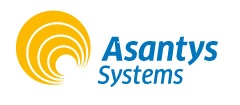Asantys Systems – Empowering Rural Communities with Solar Mini-grids (Sierra Leone)
Who, What & Where
- Asantys Systems
- 20 containerised solar systems
- Sierra Leone
The Company
ARE Member Asantys Systems is a German solar system integrator, specialising in on- and off-grid EPC project implementations, mainly in Africa. Asantys Systems serves its partners as a 360° services provider from the first planning of a solar system, the system sizing, the choice and procurement of solar components up to the installation, training, monitoring and maintenance services.
The Challenge
Sierra Leone’s challenging socio-economic context includes high poverty rates, particularly among children, unemployment, a serious lack of healthcare and limited access to electricity. As of 2020, Sierra Leone’s rural electrification rate stood at a mere 4.8%, making it one of the lowest rates in sub-Saharan Africa. Acknowledging the challenges posed by costly grid expansion, the Government of Sierra Leone (GoSL) has identified off-grid solutions as a viable approach to meet the electricity demands of its rural communities. In the wake of the Ebola virus’ impact on both the population and economy, energy generation, distribution, and governance have been included as key priorities within the Recovery Agenda. The government’s development plan also promotes low-cost renewable energy.
The Medium-Term National Development Plan 2019-2023 differs from the Recovery Agenda on the other hand by seeking to expand electricity generation, transmission, and distribution, engage the private sector, and ensure responsible leadership. With the approval of the Electricity & Water Regulatory Commission’s mini-grid regulations in 2019 by the GoSL, clarity and incentives for the off-grid sector have finally been provided. This is an indicator of the long-term commitment of the government to the sector. Multiple organisations are now contributing to enhancing electricity access in Sierra Leone.
Renewable Solution
The Sierra Leone Rural Renewable Energy Project (RREP) aimed to enhance energy access and generation capacity through renewable sources. The initiative, supported by the UK’s Foreign, Commonwealth & Development Office (FCDO) and implemented by UNOPS, the United Nations Office for Project Services, was able to provide sustainable, clean energy to 94 rural communities across 4 regions. The project provided around 5 MW of solar mini-grids, fostering social and economic growth, reducing greenhouse gas emissions, and stimulating productive use in mini-grid areas. PowerGen, through their Sierra Leone project company Off-Grid Power (SL) Ltd*, has tendered 20 containerized solar systems for implementation in Work Package 2 of the RREP. The German system integrator and EPC Asantys Systems GmbH was selected to supply the containerized solar power assets. In a remarkable collaboration, German partners SMA Sunbelt Energy, HOPPECKE Batterien and solar system integrator Asantys Systems GmbH, joined forces to supply these 20 containerized solar systems for mini grids to PowerGen Renewable Energy. Asantys Systems GmbH oversaw the design, procurement, and delivery of those systems. This milestone project, implemented by Off-Grid Power (funded by PIDG company, InfraCo Africa) aimed to provide first-time electricity to 6,657 households & businesses in Sierra Leone, making it the largest off-grid solar energy initiative in the country.
Project Financing and Costs
Project Owner: Government of Sierra Leone, Ministry of Energy
Donor: Foreign, Commonwealth and Development Office (FCDO)
Contribution: 37,739,328 GBP (43.789.885,76 €)
Project Outcome
The project aims to expand clean energy access and promote SDG7 and net-zero goals in sub-Saharan Africa. According to the Impact evaluation report of the Rural Renewable Energy Project in Sierra Leone this project’s expected impact includes economic growth, improved livelihoods, health, and education outcomes, as well as reduced Green House Gas emissions. An estimated 346,015 individuals in rural Sierra Leone have directly gained access to electricity. These beneficiaries access connections through households, CHCs, schools, commercial and productive uses and the Work Package 6 grant programme.

